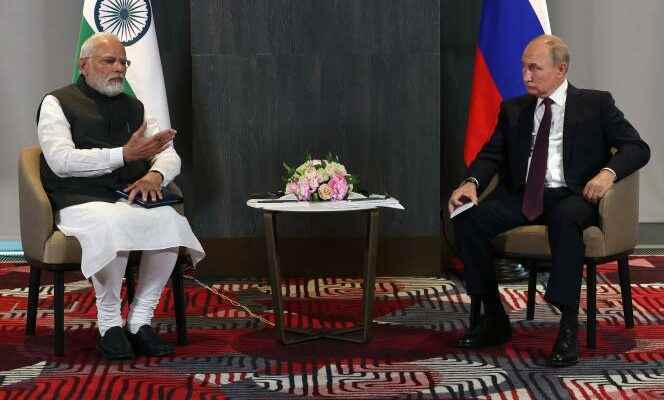It’s a sentence that comes very late and that will not be enough to mark a change of strategy. The Indian Prime Minister told President Vladimir Putin on Friday, September 16 that the time is not up. “not at war”. “I know that the current era is not an era of war, and I told you about it on the phone “, he declared to the head of the Russian state during a head to head organized during the summit of the Shanghai Cooperation Organization, in Samarkand, in Uzbekistan. In 2017, Narendra Modi chose to bring India into this organization considered as a front against the West.
Despite repeated attempts by Westerners, the Indian Prime Minister has always refused to condemn the Russian attack on Ukraine, contenting himself with calling on both parties to “return to the negotiating table” without identifying the aggressor. The big gap in Indian diplomacy continues and even increases. Just before his departure for Samarkand, Narendra Modi had received, in New Delhi, the French Foreign Minister, Catherine Colonna, to reaffirm his desire to build a cooperation and defense force in the Indo-Pacific, intended to counter the Chinese power.
Avoid alliances
By themselves, these two encounters sum up India’s paradoxical game, one foot in the Western camp, the other in the “Russian sphere”, without ever tying their hands. The West failed to bring India back into their fold, but also to force it to join the international sanctions against Moscow. The Europeans and the Americans had hoped, with the war in Ukraine, to convince Narendra Modi to distance himself from Russia, his main arms supplier and historical ally. It has not happened. India has consistently abstained from voting on UN resolutions condemning the Russian invasion. She just co-signed a G7 statement in June pledging to “respect the territorial integrity and sovereignty of other States”. And it continues to buy weapons from Moscow and its cheap oil. Despite the European embargo on Russian oil, Russia has now supplanted Saudi Arabia as India’s top oil supplier. Russian fertilizer deliveries have increased eightfold.
In Samarkand, Vladimir Putin congratulated his interlocutor on the implementation of “large-scale joint projects in the oil and gas sector and in the nuclear energy industry”. In fact, far from changing the game of Indian alliances, the Russian offensive has highlighted the new strategy deployed by New Delhi: multi-alignment. Theorized by Foreign Minister Subrahmanyam Jaishankar in his book The Indian Way (2020, untranslated), multi-alignment no longer has anything to do with the non-alignment of Nehru (1889-1964), based on Gandhian values of non-violence.
You have 51.22% of this article left to read. The following is for subscribers only.
